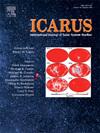Mineral abrasion experiments at Mars relevant temperatures
IF 2.5
2区 物理与天体物理
Q2 ASTRONOMY & ASTROPHYSICS
引用次数: 0
Abstract
The aeolian transport of sand generates fine material through abrasion. On Mars this process occurs at lower temperatures than on Earth, however, there is minimal data on the effects of temperature on aeolian abrasion rates. Here, results are reported of laboratory experiments where a suite of single-phase, Mars relevant minerals (feldspar, olivine, pyroxene, quartz and opal) were exposed to conditions simulating aeolian abrasion at temperatures common to the Martian surface (193 to 293 K). Our results suggest that mineral specific differences in solid phase parameters result in non-similar changes in abrasion rates with temperature. We propose this will ultimately exert a control on the composition and reactivity of the Martian surface.
火星相关温度下的矿物磨损实验
沙子的风化搬运通过磨损产生细小物质。火星上的这一过程发生在比地球更低的温度下,然而,有关温度对风化磨蚀率的影响的数据却很少。在这里,我们报告了实验室实验的结果,这些实验将一系列与火星相关的单相矿物(长石、橄榄石、辉石、石英和蛋白石)暴露在模拟火星表面常见温度(193 至 293 K)的风化磨蚀条件下。我们的研究结果表明,矿物固相参数的具体差异会导致磨损率随温度发生非相似性变化。我们认为这将最终控制火星表面的成分和反应性。
本文章由计算机程序翻译,如有差异,请以英文原文为准。
求助全文
约1分钟内获得全文
求助全文
来源期刊

Icarus
地学天文-天文与天体物理
CiteScore
6.30
自引率
18.80%
发文量
356
审稿时长
2-4 weeks
期刊介绍:
Icarus is devoted to the publication of original contributions in the field of Solar System studies. Manuscripts reporting the results of new research - observational, experimental, or theoretical - concerning the astronomy, geology, meteorology, physics, chemistry, biology, and other scientific aspects of our Solar System or extrasolar systems are welcome. The journal generally does not publish papers devoted exclusively to the Sun, the Earth, celestial mechanics, meteoritics, or astrophysics. Icarus does not publish papers that provide "improved" versions of Bode''s law, or other numerical relations, without a sound physical basis. Icarus does not publish meeting announcements or general notices. Reviews, historical papers, and manuscripts describing spacecraft instrumentation may be considered, but only with prior approval of the editor. An entire issue of the journal is occasionally devoted to a single subject, usually arising from a conference on the same topic. The language of publication is English. American or British usage is accepted, but not a mixture of these.
 求助内容:
求助内容: 应助结果提醒方式:
应助结果提醒方式:


